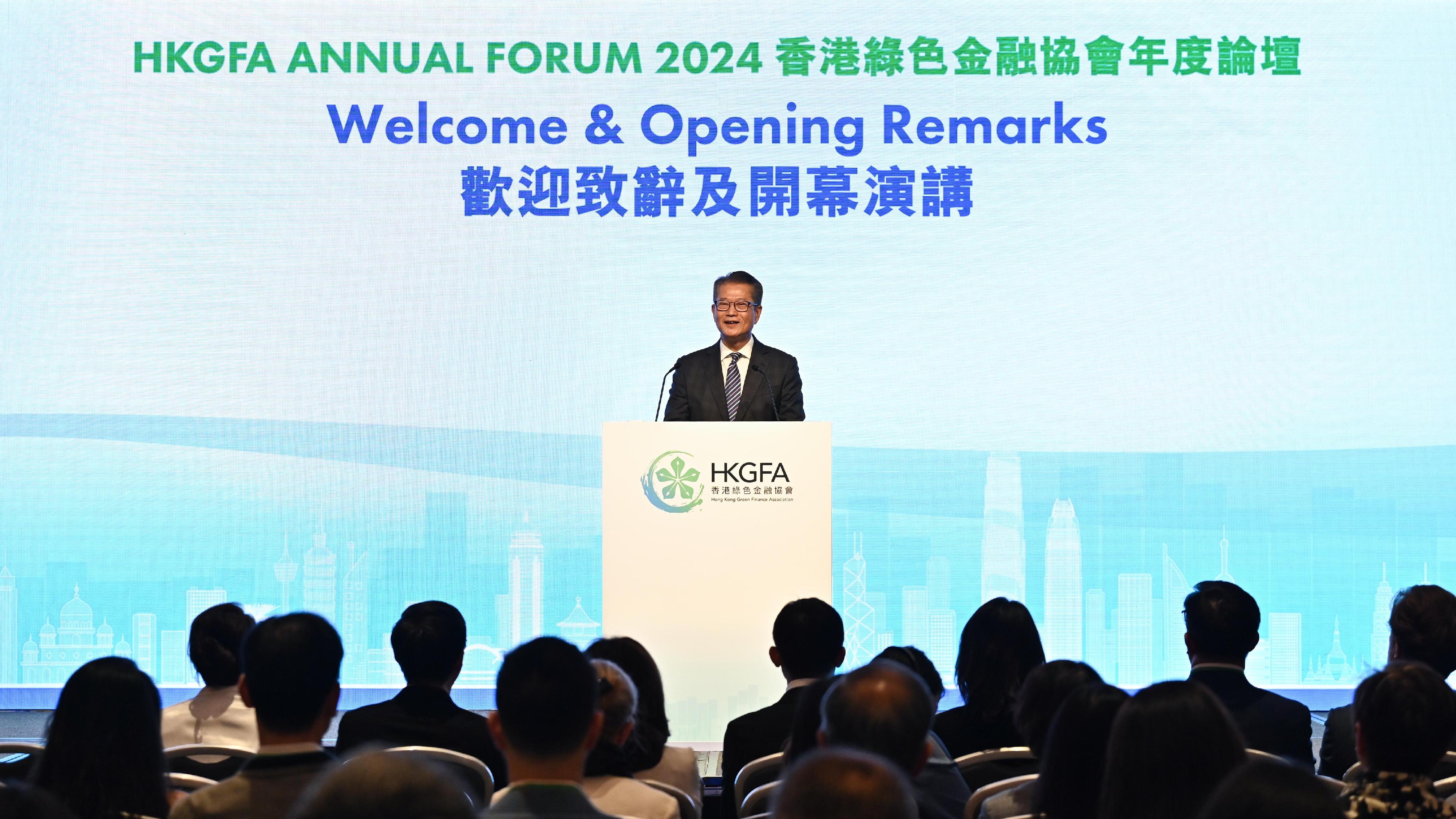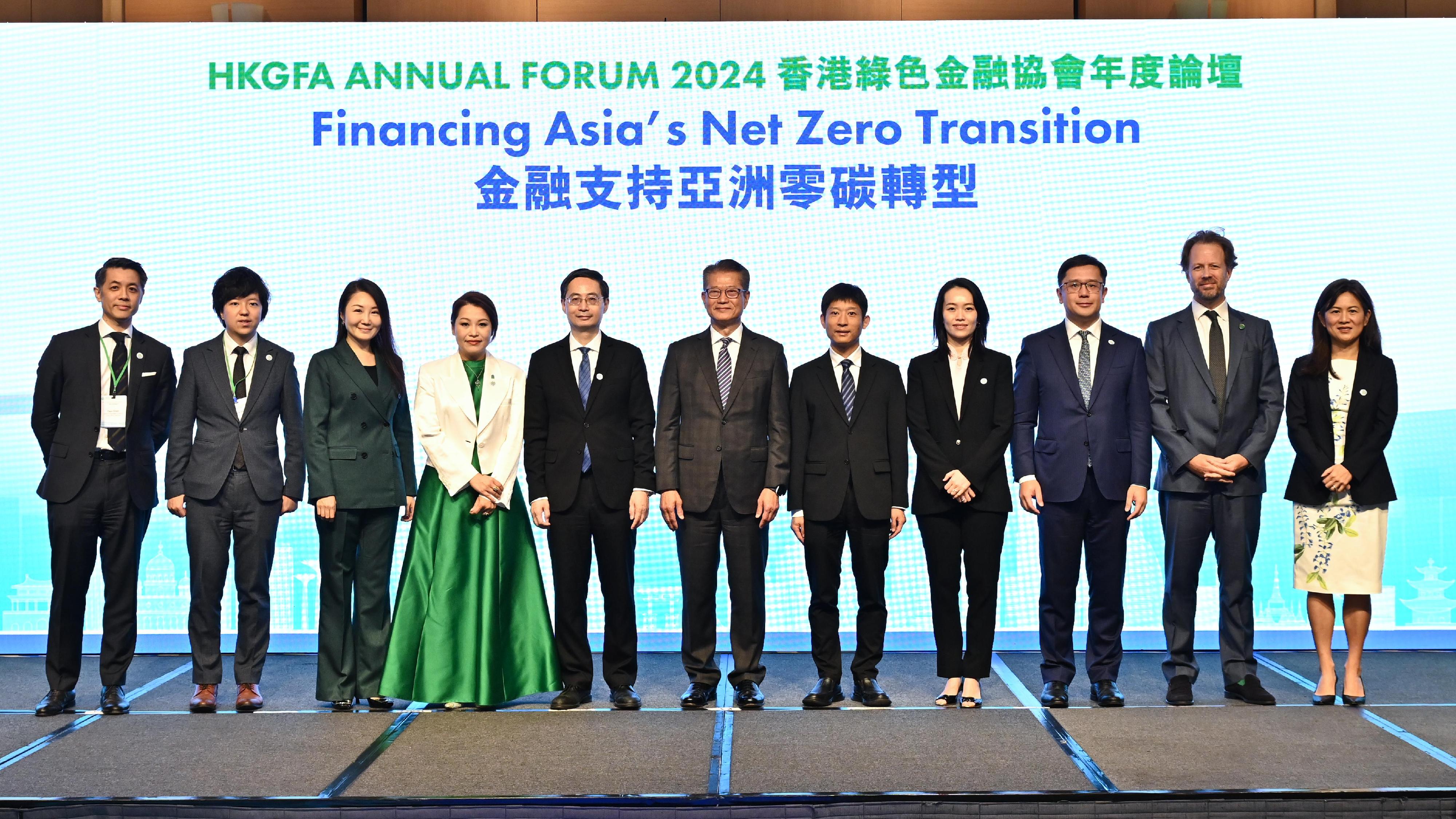​Following is the speech by the Financial Secretary, Mr Paul Chan, at the HKGFA Annual Forum 2024 "Financing Asia's Net Zero Transition" today (October 9):
Director-General Tan Yabo (the Deputy Director-General of the Department of Economic Affairs of the Liaison Office of the Central People's Government in the Hong Kong Special Administrative Region), Dr Ma (the Chairman and President of the Hong Kong Green Finance Association, Dr Ma Jun), Mary (Vice Chair of Glasgow Financial Alliance for Net Zero, Ms Mary Schapiro), Sally (Resident Representative in Hong Kong SAR (designate), International Monetary Fund, Ms Sally Chen), distinguished guests, ladies and gentlemen,
Good morning. It is my great pleasure to join you for the 7th edition of this annual flagship forum organised by the Hong Kong Green Finance Association. It is particularly timely and important for us to gather to discuss and explore how we can work together to finance Asia's net-zero transition.
Speaking to such a sophisticated audience, I need not convince you of the urgency to tackle climate change collaboratively. Nonetheless, two facts from the World Meteorological Organization serve as stark reminders of the clear and present danger of climate change to Asia: first, 2023 was the hottest year on record. Second, Asia is warming faster than the global average, and last year, it remained the world's most disaster-hit region due to weather, climate, and water-related hazards.
Global call for transition finance
Globally, as countries and regions set targets to achieve carbon neutrality, green investments have been rising. Meanwhile, transition finance is also gaining importance. In addition to investing in green initiatives, the global community has now recognised the need to assist high-emission and heavily polluting sectors in their journey to "becoming sustainable". This involves providing financial and technological resources to help them increase energy efficiency, upgrade production technologies, invest in green activities, and, ultimately, achieve net-zero emissions.
This transition is not without challenges. Reducing carbon emissions in various industries is costly. Consulting firm McKinsey, for example, has estimated that achieving low-carbon transition requires an average spending of US$9.2 trillion annually on physical assets from the year 2021 to 2050. And there is a significant shortfall of US$3.5 trillion per year.
Given the substantial scale of transition investments, there is broad international consensus to mobilise private capital to help finance them. For example, the European Commission has stated that a significant portion of investments needed to meet the EU's climate goals must originate from the private sector. Similarly, the IMF (International Monetary Fund) forecasted that for emerging economies, approximately 80 per cent of the necessary investments in climate mitigation by 2030 should come from private entities.
However, in contrast to these projections, private sector investors have not allocated as much capital as necessary to the relevant sectors. ESG (environmental, social and governance) investing, a commonly used asset allocation strategy, often excludes high-emission and heavily polluting industries. A study of 300 institutional investors in Europe, North America and the Asia-Pacific this year suggested that only 37 per cent of investors allocated funds to "transitioning" companies, with an additional 26 per cent planning such allocations within the next two years. Obviously, they are insufficient to bridge the funding gap.
Another challenge for transition finance is "transition-washing". While we are familiar with "greenwashing", in the context of transition activities, there may be additional complexity, particularly in defining what actually constitutes "becoming sustainable". It is also crucial to ensure that funds are used to finance legitimate decarbonisation initiatives rather than prolonging unsustainable practices.
Hong Kong's opportunities in transition finance
Ladies and gentlemen, while the challenges in transition finance may sound daunting, they also present unique opportunities for Hong Kong.
First, we can be Asia's leading transition finance hub. With the concerted efforts from the Government and the industry, Hong Kong has made significant strides in the space of green and sustainable finance. We stand as Asia's leading green financing hub. Over the past three years, we issued an average over US$63 billion in green bonds and debts annually. The number of ESG funds authorised by the SFC (Securities and Futures Commission) has also been on the rise. As of June this year, there were over 230 such funds, managing assets exceeding US$160 billion, representing a 60 per cent growth compared to three years ago.
That means Hong Kong already has a strong foundation to develop the transition finance market – including a robust regulatory framework, the necessary financial infrastructure, a well-developed finance market, and the expertise on standard-setting and compliance. What we need now is to raise the awareness of the necessity of transition finance, and the potential it offers.
We are pressing ahead. For example, in my Budget this year, we extended the Green and Sustainable Finance Grant Scheme to 2027. To incentivise the use of Hong Kong as a transition financing platform, the Scheme has been expanded to cover transition bonds and loans.
On green standards setting, we participate in the global efforts in developing taxonomies to delineate permissible activities. These frameworks serve as universal language among investors, issuers, policymakers, and other stakeholders to combat "greenwashing", as well as "transition-washing".
In May this year, the Hong Kong Monetary Authority (HKMA) published the Hong Kong Taxonomy for Sustainable Finance, aiming to facilitate informed investment decisions on green and sustainable finance and thereby scaling up relevant investments. Our Taxonomy was devised to be compatible with the two mainstream taxonomies, the Mainland and the European Union. Currently, the HKMA is developing the next phase of the Taxonomy to include transition activities. It is our plan to conduct a public consultation for this in early 2025. Our efforts will contribute to the global development and consensus-building on transition taxonomy.
Improving sustainability disclosure at the company level will enable investors to assess whether and how companies have met their environmental and sustainability commitments. In March this year, the Government issued a statement, which sets out our vision to be among the first jurisdictions to align local sustainability disclosure requirements with the standards set by the International Sustainability Standards Board, the ISSB. In this regard, the Hong Kong Stock Exchange also announced in April that it would implement amended listing rules with new climate requirements starting in 2025. Moreover, in September, the Hong Kong Institute of Certified Public Accountants released an exposure draft on the financial reporting standards on sustainability disclosures, which will assist investors in obtaining more reliable ESG information about companies.
Finally, voluntary carbon market plays a significant role in facilitating transition finance. In my view, it not only encourages environmental responsibility but will also fosters cross-boundary collaboration in investment in clean energy and other carbon emission solutions.
Closing remarks
Ladies and gentlemen, from where we stand, I feel optimistic about what Hong Kong can achieve in transition finance. However, we need your insightful ideas on what we may do more and better, and these will make this Forum all the more inspiring and meaningful. I wish you all a fruitful and rewarding forum, and the best of health and business in the years to come. Thank you very much.
Follow this news feed: East Asia







